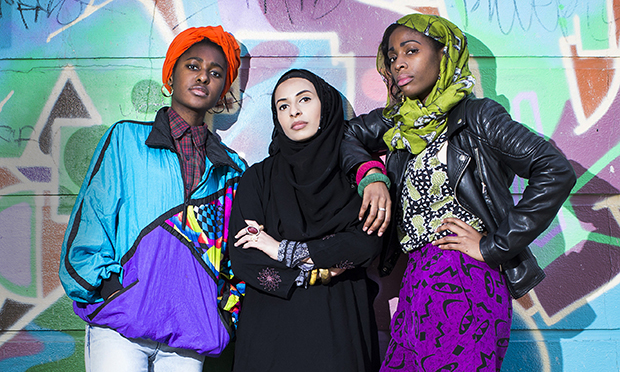Homegrown – young, gifted and radicalised
When three teenage girls from Bethnal Green ran away to join Isis earlier this year, the shocking news was splashed over all the front pages.
CCTV pictures showed the girls, pupils at Bethnal Green Academy who were studying for their GCSEs, calming passing through security at Gatwick airport, leaving behind distraught families and friends.
Now a new play called Homegrown, in part inspired by the story of the Bethnal Green teenagers, is setting out to tackle the subject of radicalisation among young Muslims and the lure of Isis.
The site-specific piece will be set inside a school, The UCL Academy over in West London, and promises to be a spectacle, with a cast made up of 115 members of the National Youth Theatre.
Director Nadia Latif and writer Omar El-Khairy wanted the production to be steeped in the views of a wide range of people, so part of the show uses verbatim interviews with East London residents.
“We talked with everyone from local vicars, to shopkeepers to people in the park, and just asked them what the story meant to them,” says Latif.
“We interviewed a couple that lived opposite Bethnal Green Academy, and they had one set of views on it. But there was a breadth of responses. It’s not dramatising the story but using it to ask what it takes to give up your life and leave like that.”
What with Alecky Blythe’s Little Revolution and Jonathan Maitland’s An Audience with Jimmy Savile, there seems to be a real appetite in East London for verbatim theatre that offers a dramatic take on real life events.
But the story of the teenagers from Bethnal Green Academy is arguably more sensitive, in that there are families to consider – and we still don’t really know what has happened to the girls. I ask how, if at all, this affected the play.
“I’m not interested in ambulance chasing at all and we’re not trying to be sensationalist,” Latif responds. “This is something that’s been happening for a really long time, and we had the idea for the show before that had even happened.
“But it gave us a point of reference to talk to audiences with. We wouldn’t have had the idea to go into the Bethnal Green community and talk to people otherwise, so it’s been a really good galvanising point and frame of reference.”
But the main reason why that particular story captured the public imagination and remains intriguing is that the motivation behind the girls’ actions is so difficult to grasp. What answers does the play give?
“I don’t think it’s a theatre maker’s job to have an answer,” Latif says. “I personally have an opinion, but I think any piece of theatre that has an answer is not only probably wrong, but is also unlikely to be a very good piece of theatre.
“Theatre’s job is to tell a story and ask an audience questions, hoping they might leave and discuss that, and maybe we’ll show them a new way of looking at it. But it definitely doesn’t come to a conclusion and there’s no authentic conclusion to be had anyway.”
Latif has worked on site-specific pieces before such, as Rupert Gould’s play about 9/11, Decade, and has experience with large-scale works.
Homegrown, however, is the most ambitious production Latif has been involved with to date. But when I ask her how the production intends to use a school as its setting, she remains tight-lipped.
“I think people will have to take a chance and be brave and know that they’re going to see some stuff that they’ve never seen before, but the rest is a mystery.”
Homegrown
12–29 August
The UCL Academy
Adelaide Road
NW3 3AQ
| image by helen maybanks

